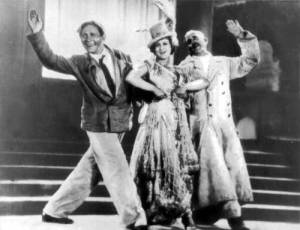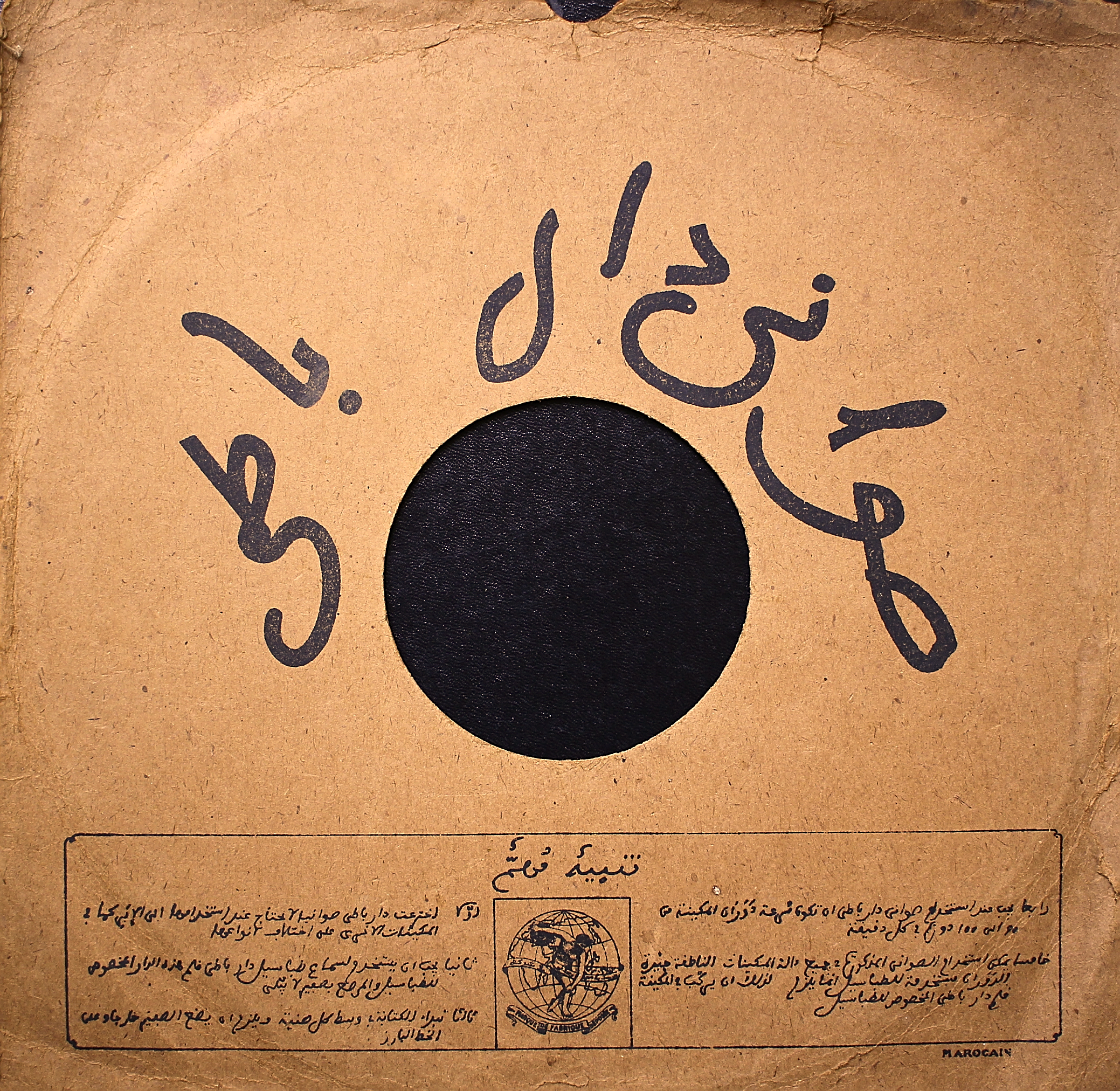
You might remember that I posted a few weeks ago this unexpected Russian version of La Cucaracha and wrote about the funny way I managed to find some 78 rpm records in Armenia. Here are two other interesting recordings from the late 40’s…
To be honest, I didn’t know anything about music of USSR before putting these mysterious records on my turntable. I must also confess I was really surprised to discover that this kind of “light music” existed under Stalin… Listening to these jazzy tracks aroused my curiosity and I decided to do some research about the musical life in the USSR. Thats’s how I found a very interesting book dedicated to the history of Soviet jazz, Red & Hot – The fate of jazz in the Soviet Union, written by American historian and jazz musician Stephen Frederick Starr (French readers might appreciate its nice cover by cartoonist Sempé).

The purpose of this post is not to make a complete summary of Mr. Starr’s essay, which can furthermore be consulted here. I still would like to introduce a bit the historical background of these two recordings. While reading this book, I discovered, indeed, that the development of jazz in the USSR was deeply linked to the political and ideological context and strongly reflected the perception of America overtime in this socialist country.
Jazz was first introduced in Russia in 1922 by the avant-garde poet Valentin Parnakh, who had discovered this music a few years before in Paris. Back in Moscow, he formed the so-called “First eccentric orchestra of the Russian Soviet Federated Socialist Republic – Valentin Parnakh’s jazz band“. This new music style didn’t meet a large audience first, as Jazz was only known among elitist circles. The first popular success came with the live performance of Parnakh’s band in Vsevolod Meyerhold‘s theater play “The Magnanimous Cuckold“. But the real enthusiasm for jazz followed the tours in USSR of American bands Sam Wooding and The Chocolate Kiddies and Benny Peyton’s Jazz Kings in 1926.

Unlike many western countries at that time, The Soviet Union was first relatively tolerant towards jazz. It didn’t last. The rise of Stalin after Lenin’s death in 1924 led to a period of restrictions in the field of culture in the late 20’s. In this context, jazz became the target of ideological attacks. In april 1928, the writter Maxime Gorki published in the famous newspaper Pravda an essay called “On the music of the gross“, in which jazz was described as an “insulting chaos of insanity” and, through dance and erotism, as a symbol of degenerate capitalism. These arguments were echoed by the powerful “Association of proletarian musicians“, which was leading the campaign against jazz, considered as a “non-proletarian” music. The consequences were immediate : playing and listening to jazz were theoretically prohibited, as well as importing and selling jazz records.
Despite these measures, jazz remained popular, as the Association of proletarian musicians was totally unable to propose any quality alternatives. In 1932, after a period of critics, jazz was finally rehabilitated. Its success was meteoric and jazz bands flourished in the whole country. This period can be considered as the golden age of Soviet Jazz.
Leonid Utesov (Леонид Утёсов) and Alexander Tsfasman (Александр Цфасман) can be considered as the most emblematic artists from this golden age. Utesov was born in Odessa in 1895 and began his career playing guitar and violin and performing as a clown and an acrobat in a different circus troupes. In the years before World War I, he started singing in bars, theaters and music halls in the south of Russia, and then moved to former Petrograd (renamed Leningrad from 1924 to 1991). After a decade of performance there, he had the chance to make a tour in Latvia in 1928, and then traveled to Berlin and Paris, where he saw Mistinguett, Maurice Chevalier and Joséphine Baker on stage, as well as several American jazz bands.

Considering himself more as an actor than a musician, Utesov was a showman focusing mainly on his impact on the audience. These bands he saw in Paris had a strong influence on him. Back in Leningrad, he formed his own orchestra in 1929 with classical musicians and mixed jazz, theatre and songs. His popularity was immediate and reached its peak in 1934 with Utesov’s role in the first Soviet musical comedy “Jolly Fellows“, in which he was playing a jazz orchestra’s conductor. After that, he became one of the most beloved artist in the USSR. This also meant that he had to make some compromises with the authorities. Utesov and his band performed during World War II in the front lines for Soviet soldiers, they also gave an open-air concert in Moscow on May 9th 1945 to celebrate the victory.

Let’s talk about the record, now ! This song is called “Дорогие мои москвичи” (“Dorogie moi moskvichi“), which means “My dear Muscovites“, and sounds quite typical of Utesov’s light style. It was written in 1947 for the commemoration Moscow’s 800th anniversary and performed by Utesov and his daughter Edit. Music was composed by Isaak Dunayevsky, with lyrics of Vladimir Mass and Mikhail Chervinsky. The record was published by Aprelevka Plant (Апрелевский завод) label.
You can also watch a live performance of this song here and enjoy Utesov’s talents as an actor. A second post about Soviet jazz focusing on pianist Alexander Tsfasman will follow…
Update : This song was used in the 1982 film The Pokrovsky Gate (Покровские ворота), directed by Mikhail Kozakov (Михаил Михайлович Козаков). Many thanks to Dondublon from Master Russian Forum for this information ! And it was performed by Utesov and his daughter Edit (and not his sister, as I wrote first). Thanks to Andrew from the Dismuke Message Board for this correction !
Update [June 18th 2013] : Arkady Kokorin kindly offered to translate the song from Russian, thanks to him!!! Here is the translation:
Moscow quietens, the horizon is blue,
Beams of Kremlin’s rubies shine brighter.
The day has gone, the night is soon
You likely get tired…
My dear Muscovites
This song may be over in usual words,
If each ones are still so fervent.
I hope we will meet you once more…
My dear Muscovites
What should I tell you for a farewell?
How should I honor your regards?
Good night, my dearest Muscovites,
Good night, my dears, remember us
However, when you will return to homes
How can I gather keys from hearts of yours
To help you with your works by songs
My dearest Muscovites
Thin buildings are cuddled by a blue mist,
Beams of Kremlin’s rubies shine brighter
Affairs are waiting, the night is nearby –
Good bye, Muscovites, good-bye…
What should I tell you for a farewell?
How should I honor your regards?
Good night, my dearest Muscovites,
Good night, my dears, remember us
(2x)

Fantastic stuff! Thanks. Looking forward to the post on Tsfasman. I’m currently compiling a post on the history of the Third Stream so Soviet aspect – with the country’s great classical pedigree – looks promising.
Thanks a lot for your kind comment ! Looking forward to reading your post aswell ! You should really have a look on Stephan F. Starr’s essay, you might find interesting elements concerning the links between jazz and classical music.
The recording date was 9 July 1947. I was fortunate in knowing the late Valari Safooshkin who was a friend, biographer, discographer, and re-issuer of Utesov. Eksmo published Safooshkin’s biography of Utesov in Russian in 2005 which includes dozens of pictures and a complete discography. Although his 78s are difficult to find, there also have been many Melodiya LPs issued of Utesov in the Soviet years. Fortunately Safooshkin was able to compile a series of 11 CDs of his friend Utesov, and these can still be found..
Thanks a lot for your comment ! That’s exactly the kind of information and testimonies I’m looking for ! I bought these Soviet records in Armenia a few years ago, at this time I was not especially interested in 78’s and had not idea of their value. I bought several records there, but most of them are classical music, I wish I found more jazz recordings, but I had never heard of Utesov or Tsfasman at that time… Next time ? Thank you very much !
Do you happen to know the exact title of this book? Does it also contain all matrix numbers of the records issued? We need this information for the online catalogue of Russian records – or maybe you have got a copy and could helpus with the information? Thanks
Interesting post – I read Starr’s book years before I had heard any Soviet jazz – great to hear this!
Thanks for your comment ! I wish this post could be a kind of “soundtrack” to the book !
Check this excellent review of a film… that doesn’t exist ! With pieces of Soviet jazz inside ! http://noncinematour.wordpress.com/2012/02/17/the-fate-of-jazz/
Thank you for this song ! It is very beautiful and…warm 🙂
Merci pour ton commentaire !
Hi.. Thanks for visit my blog, as requested, I visit yours now LOL
Great blog and articles! let’s do link exchange with my jazz blog Jazz Jazz Jazz
🙂
love this song. But I don’t speak Russian. Is there a transliterated english version available, so I could learn it? and a translation? thanks!
Thanks for your comment ! I unfortunately couldn’t find any English translation of this song, I will let you know if I find something later (any Russian speaking readers who could help us ???).
Maybe it’s so late, anyway I can translate this song (I’m from Russia). I’ll be happy to help you.
Hello Arkady, that would be great ! Thank you very much for your help !
Oh, I’ll do it with a big pleasure! However there are some difficulties with russian idioms but I’ll try to translate them for english speakers. So, where can I send the translation after I’ll do it?
I just sent you a private message. Thanks a lot!
Hey! was reading your blog, came here from Dismuke message board.
One small but important note.
Edith wasn’t Utesov’s wife, she was Utesov’s daughter )))
Beautiful voice! New link to the video
Hi Andrew, thanks a lot for this correction, I will update the post. And thanks for the video !